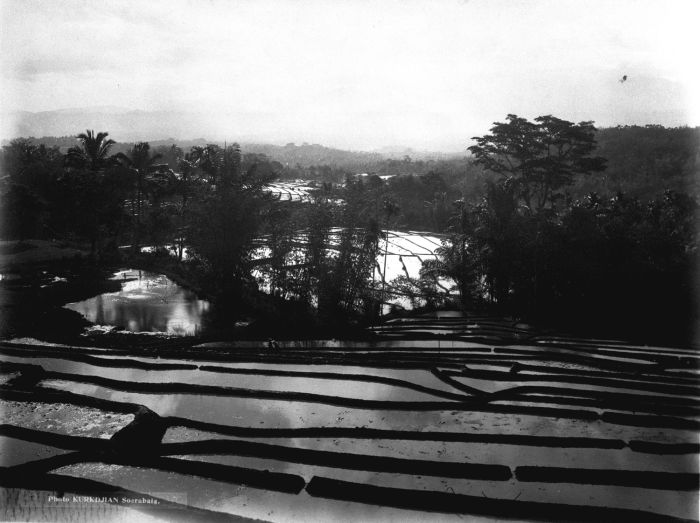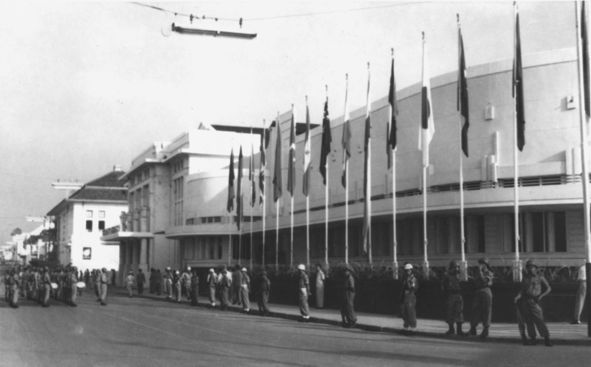|
Ong Hok Ham
Ong Hok Ham (1 May 1933 – 30 August 2007) was an eminent Chinese Indonesian historian considered one of the leading experts on Indonesian history during the 19th century Dutch colonial rule. His particular area of knowledge centered on events in Java during the period, and he authored a number of works dealing with the subject. A native of Surabaya, East Java which, until the founding of Indonesia in 1945, was a part of the Dutch East Indies, Ong Hok Ham lived in the city of his birth for the first twenty-five years of his life. Ong's family was upper-middle class, but through his maternal grandmother, Han Loen Nio, Ong hailed from the patrician Han family of Lasem, part of the '' baba bangsawan'' or the Chinese gentry of colonial Indonesia, and from a long line of Chinese officers who served in the civil bureaucracy in the Dutch East Indies. Ong could, thus, trace his lineage in Java back, through Han Bwee Kong, Kapitein der Chinezen (1727 – 1778), to Han Siong Kong (1 ... [...More Info...] [...Related Items...] OR: [Wikipedia] [Google] [Baidu] |
Surabaya
Surabaya ( jv, ꦱꦸꦫꦧꦪ or jv, ꦯꦹꦫꦨꦪ; ; ) is the capital city of the Provinces of Indonesia, Indonesian province of East Java and the List of Indonesian cities by population, second-largest city in Indonesia, after Jakarta. Located on the northeastern border of Java island, on the Madura Strait, it is one of the earliest port cities in Southeast Asia. According to the Government of Indonesia, National Development Planning Agency, Surabaya is one of the Regions of Indonesia#Development regions, four main central cities of Indonesia, alongside Jakarta, Medan, and Makassar. The city has a population of 2.87 million within its city limits at the 2020 census and 9.5 million in the extended Surabaya metropolitan area, making it the List of metropolitan areas in Indonesia, second-largest metropolitan area in Indonesia. The city was settled in the 10th century by the Janggala, Kingdom of Janggala, one of the two Javanese kingdoms that was formed in 1045 when ... [...More Info...] [...Related Items...] OR: [Wikipedia] [Google] [Baidu] |
Kapitan Cina
Kapitan Cina, also spelled Kapitan China or Capitan China ( en, Captain of the Chinese; ; nl, Kapitein der Chinezen), was a high-ranking government position in the civil administration of colonial Indonesia, Malaysia, Singapore, Borneo and the Philippines. Office holders exercised varying degrees of power and influence: from near-sovereign political and legal jurisdiction over local Chinese communities, to ceremonial precedence for community leaders. Corresponding posts existed for other ethnic groups, such as Kapitan Arab and Kapitan Keling for the local Arab and Indian communities respectively. Pre-colonial origin The origin of the office, under various different native titles, goes back to court positions in the precolonial states of Southeast Asia, such as the Sultanates of Malacca in the Malay peninsula, the Sultanate of Banten in Java, and the Kingdom of Siam in mainland Southeast Asia.Ooi, Keat Gin. ''Southeast Asia: A Historical Encyclopedia, From Angkor Wat to Eas ... [...More Info...] [...Related Items...] OR: [Wikipedia] [Google] [Baidu] |
2007 Deaths
This is a list of deaths of notable people, organised by year. New deaths articles are added to their respective month (e.g., Deaths in ) and then linked here. 2022 2021 2020 2019 2018 2017 2016 2015 2014 2013 2012 2011 2010 2009 2008 2007 2006 2005 2004 2003 2002 2001 2000 1999 1998 1997 1996 1995 1994 1993 1992 1991 1990 1989 1988 1987 See also * Lists of deaths by day The following pages, corresponding to the Gregorian calendar, list the historical events, births, deaths, and holidays and observances of the specified day of the year: Footnotes See also * Leap year * List of calendars * List of non-standard ... * Deaths by year {{DEFAULTSORT:deaths by year ... [...More Info...] [...Related Items...] OR: [Wikipedia] [Google] [Baidu] |
1933 Births
Events January * January 11 – Sir Charles Kingsford Smith makes the first commercial flight between Australia and New Zealand. * January 17 – The United States Congress votes in favour of Philippines independence, against the wishes of U.S. President Herbert Hoover. * January 28 – "Pakistan Declaration": Choudhry Rahmat Ali publishes (in Cambridge, UK) a pamphlet entitled ''Now or Never; Are We to Live or Perish Forever?'', in which he calls for the creation of a Muslim state in northwest India that he calls " Pakstan"; this influences the Pakistan Movement. * January 30 ** National Socialist German Workers Party leader Adolf Hitler is appointed Chancellor of Germany by President of Germany Paul von Hindenburg. ** Édouard Daladier forms a government in France in succession to Joseph Paul-Boncour. He is succeeded on October 26 by Albert Sarraut and on November 26 by Camille Chautemps. February * February 1 – Adolf Hitler gives his "Proclamation to ... [...More Info...] [...Related Items...] OR: [Wikipedia] [Google] [Baidu] |
List Of Chinese Indonesians
This is a list of notable Chinese Indonesians: Academics * Arief Budiman (史福仁), sociologist, professor, University of Melbourne, formerly at Satya Wacana Christian University, brother of Soe Hok Gie. * Hadi Soesastro (陳余明), economist, political scientist (international relations), founder and former Executive Director of Centre for Strategic and International Studies (Indonesia). * Jusuf Wanandi (林綿基/林绵基), political scientist (international relations). * Leo Suryadinata (廖建裕), sinologist. * Ong Hok Ham (王福涵), historian. * Mely G. Tan (陳玉蘭/陈玉兰), Indonesian sociologist. * Merlyna Lim, professor & Canada Research Chair in Digital Media and Global Network Society. * Soe Tjen Marching (史曾), feminist academic, composer, writer. Activists * Aw Tjoei Lan, anti-human trafficking activist and founder of the charity organization ''Ati Soetji''. * Lie Eng Hok, Indonesian independence activist and political prisoner, was declared a Pione ... [...More Info...] [...Related Items...] OR: [Wikipedia] [Google] [Baidu] |
West Jakarta
West Jakarta ( bew, Jakarte Bekulon; id, Jakarta Barat) is one of the five Cities of Indonesia, administrative cities of the Jakarta, Special Capital Region of Jakarta, Indonesia. West Jakarta is not Self-governance, self-governed and does not have a city council, hence it is not classified as a proper municipality. It had a population of 2,281,945 at the 2010 Census and 2,434,511 at the 2020 Census. The administrative center of West Jakarta is at Puri Kembangan. West Jakarta is bordered by Tangerang Regency and North Jakarta to the north, Central Jakarta to the east, South Jakarta to the south, and Tangerang city to the west. History West Jakarta is famous for its Dutch colonial relics such as Town Hall Building (now Jakarta History Museum in Jakarta Old Town), Chinatown (Glodok) and also a number of old churches, mosques, and fortresses of early Dutch colonization in Batavia, Dutch East Indies, Batavia at that time. Districts West Jakarta is subdivided into eight districts ... [...More Info...] [...Related Items...] OR: [Wikipedia] [Google] [Baidu] |
Buddhist
Buddhism ( , ), also known as Buddha Dharma and Dharmavinaya (), is an Indian religion or philosophical tradition based on teachings attributed to the Buddha. It originated in northern India as a -movement in the 5th century BCE, and gradually spread throughout much of Asia via the Silk Road. It is the world's fourth-largest religion, with over 520 million followers (Buddhists) who comprise seven percent of the global population. The Buddha taught the Middle Way, a path of spiritual development that avoids both extreme asceticism and hedonism. It aims at liberation from clinging and craving to things which are impermanent (), incapable of satisfying ('), and without a lasting essence (), ending the cycle of death and rebirth (). A summary of this path is expressed in the Noble Eightfold Path, a training of the mind with observance of Buddhist ethics and meditation. Other widely observed practices include: monasticism; " taking refuge" in the Buddha, the , and th ... [...More Info...] [...Related Items...] OR: [Wikipedia] [Google] [Baidu] |
English Language
English is a West Germanic language of the Indo-European language family, with its earliest forms spoken by the inhabitants of early medieval England. It is named after the Angles, one of the ancient Germanic peoples that migrated to the island of Great Britain. Existing on a dialect continuum with Scots, and then closest related to the Low Saxon and Frisian languages, English is genealogically West Germanic. However, its vocabulary is also distinctively influenced by dialects of France (about 29% of Modern English words) and Latin (also about 29%), plus some grammar and a small amount of core vocabulary influenced by Old Norse (a North Germanic language). Speakers of English are called Anglophones. The earliest forms of English, collectively known as Old English, evolved from a group of West Germanic (Ingvaeonic) dialects brought to Great Britain by Anglo-Saxon settlers in the 5th century and further mutated by Norse-speaking Viking settlers starting in the 8th and 9th ... [...More Info...] [...Related Items...] OR: [Wikipedia] [Google] [Baidu] |
Star Weekly (Indonesian Magazine)
''Star Weekly'' was an Indonesian language magazine published in Jakarta, Indonesia from 1946 to 1961. The magazine was an offshoot of the popular newspaper Keng Po (newspaper), Keng Po and is considered to be a precursor to today's Kompas. Through its charismatic editor Petrus Kanisius Ojong it became a widely-respected forum for Chinese Indonesians, Chinese Indonesian intellectual discussion, cultural expression, and critical political coverage. The magazine also printed pieces by a number of notable Indonesian writers of the early independence era, including Pramoedya Ananta Toer, Trisno Sumardjo, Ong Hok Ham, Suwarsih Djojopuspito, and Ajip Rosidi. History Early years ''Star Weekly'' was the group effort of a number of Peranakans, Peranakan journalists who had been active in the late colonial era in the Dutch East Indies but who had been censored or even imprisoned during the Japanese occupation of the Dutch East Indies. It was launched in January 1946 as a monthly magazine p ... [...More Info...] [...Related Items...] OR: [Wikipedia] [Google] [Baidu] |
West Java
West Java ( id, Jawa Barat, su, ᮏᮝ ᮊᮥᮜᮧᮔ᮪, romanized ''Jawa Kulon'') is a province of Indonesia on the western part of the island of Java, with its provincial capital in Bandung. West Java is bordered by the province of Banten and the country's capital region of Jakarta to the west, the Java Sea to the north, the province of Central Java to the east and the Indian Ocean to the south. With Banten, this province is the native homeland of the Sundanese people, the second-largest ethnic group in Indonesia. West Java was one of the first eight provinces of Indonesia formed following the country's independence proclamation and was later legally re-established on 14 July 1950. In 1966, the city of Jakarta was split off from West Java as a 'special capital region' (), with a status equivalent to that of a province, while in 2000 the western parts of the province were in turn split away to form a separate Banten province. Even following these split-offs, West Java is ... [...More Info...] [...Related Items...] OR: [Wikipedia] [Google] [Baidu] |
Bandung
Bandung ( su, ᮘᮔ᮪ᮓᮥᮀ, Bandung, ; ) is the capital city of the Indonesian province of West Java. It has a population of 2,452,943 within its city limits according to the official estimates as at mid 2021, making it the fourth most populous city in Indonesia. Greater Bandung (Bandung Basin Metropolitan Area/BBMA) is the country's third-largest metropolitan area, with nearly nine million inhabitants. Located above sea level, the highest point in the North area with an altitude of 1,050 meters and the lowest in the South is 675 meters above sea level, approximately southeast of Jakarta, Bandung has cooler year-round temperatures than most other Indonesian cities. The city lies on a river basin surrounded by volcanic mountains that provides a natural defence system, which was the primary reason for the Dutch East Indies government's plan to move the capital from Batavia (modern-day Jakarta) to Bandung. The Dutch first established tea plantations around the mou ... [...More Info...] [...Related Items...] OR: [Wikipedia] [Google] [Baidu] |




